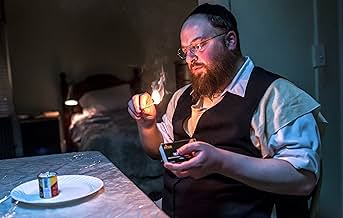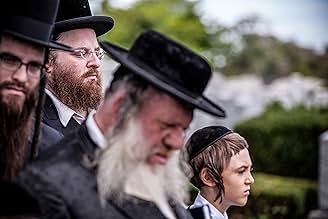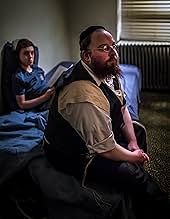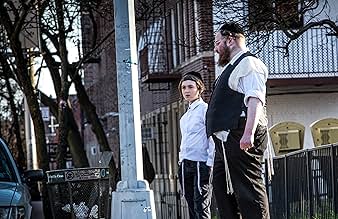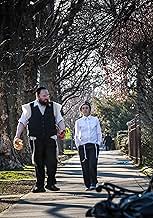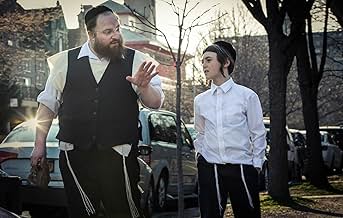VALUTAZIONE IMDb
6,6/10
2707
LA TUA VALUTAZIONE
Aggiungi una trama nella tua linguaWithin Brooklyn's ultra-orthodox Jewish community, a widower battles for custody of his son. A tender drama performed entirely in Yiddish, the film intimately explores the nature of faith an... Leggi tuttoWithin Brooklyn's ultra-orthodox Jewish community, a widower battles for custody of his son. A tender drama performed entirely in Yiddish, the film intimately explores the nature of faith and the price of parenthood.Within Brooklyn's ultra-orthodox Jewish community, a widower battles for custody of his son. A tender drama performed entirely in Yiddish, the film intimately explores the nature of faith and the price of parenthood.
- Regia
- Sceneggiatura
- Star
- Premi
- 7 vittorie e 18 candidature totali
Meir Ber Schwartz
- The Ruv
- (as Meyer Schwartz)
Melissa Weisz
- Bayla
- (voce)
Recensioni in evidenza
Really like the film.
I'm hoping that I got a pretty actuate perceptive on the Hasidic Jewish community. I'm aware of some aspects about how women are treated as a whole, which for me, made it more interesting that the movie tells a story about a widowed father trying to raise his son in a society that says he can't do it.You don't see that enough in movies in general. A man doing what he has to to be a man in order to raise his child alone, and I'm seeing it in the most rarest prospective.
It reminds me of Moonlight, it's not really a story I've never herd before but nobody tells the story from this unique angel.
Brilliant! http://cinemagardens.com
I'm hoping that I got a pretty actuate perceptive on the Hasidic Jewish community. I'm aware of some aspects about how women are treated as a whole, which for me, made it more interesting that the movie tells a story about a widowed father trying to raise his son in a society that says he can't do it.You don't see that enough in movies in general. A man doing what he has to to be a man in order to raise his child alone, and I'm seeing it in the most rarest prospective.
It reminds me of Moonlight, it's not really a story I've never herd before but nobody tells the story from this unique angel.
Brilliant! http://cinemagardens.com
"Menashe" is a semi-documentary, reflecting the case of Menashe Lustig, the actor performed the main character. A film about laws of an ultra conservative community, about parenthood and about life. And , sure, about vulnerable people. Touching and delicate and precise, the work of Menashe Lustig is just admirable. He is the film and I admitt, I saw me reflected in his beautiful portrait of the single father , lost across the challenges, naive and man of good intentions, prisoner of his life. So, a gem . A real special one because it is not a lesson but a confession, honest at whole.
Struggle is something that is universal. Adversity doesn't care who you are, where you have come from, or even who you know. Granted, it can be relative, but no matter who you are, road blocks are still road blocks. Documentarian and first-time narrative director Joshua Z. Weinstein takes this theme but looks at it from a different direction with "Menashe," featured at this year's Dallas International Film Festival and now getting a wider release.
The title character is played by Menashe Lustig and is a widower who is just trying to get by in his ultra-orthodox Jewish community. He is still mourning the loss of his wife a year later while constantly chasing his bills working at a local Jewish market, and he is also dealing with the fact that he does not have custody of his son, Rieven (Ruben Nidorski) due to his religious beliefs that children must be raised in a two-parent household. Until he remarries, Rieven has to live with his brother, Eizik (Yoel Weisshaus), and his family. Menashe has always been seen as the lesser of his siblings, so he embarks on a journey of self-discovery and responsibility just to try for a normal life.
Weinstein takes his documentary-style of filming (with no score and a lot of steady-cam shots) and applies it here, which gives it an intimate feel that really enhanced my emotional investment into his story (which he also co-wrote with Alex Lipschultz). In my comments to our vendor after the screening, I used the phrase "both heartbreaking and heartwarming," and this is the best way I can describe "Menashe". Lustig plays the lead character in a way that even though his struggles are specific to a demographic, there are themes of independence, responsibility, and family that each and every one of us can identify with and feel for him during. His work with Nidorski is very organic, and it works on every level. Almost the entire film is translated from Yiddish, but as real and powerful as this story is, the subtitling bothered me even less than it normally does.
It is true that this film may not be seen as "for everyone" due to the community that it takes place in, but I fully and whole-heartedly disagree. Its universal themes are presented in a way that its context is well-explained so that the audience can see why the traditions are what they are. Much like "Donovan" earlier this year, "Menashe" is an independent film that tells its story in an honest and grounded way that deserves to be seen by as large of an audience as possible.
The title character is played by Menashe Lustig and is a widower who is just trying to get by in his ultra-orthodox Jewish community. He is still mourning the loss of his wife a year later while constantly chasing his bills working at a local Jewish market, and he is also dealing with the fact that he does not have custody of his son, Rieven (Ruben Nidorski) due to his religious beliefs that children must be raised in a two-parent household. Until he remarries, Rieven has to live with his brother, Eizik (Yoel Weisshaus), and his family. Menashe has always been seen as the lesser of his siblings, so he embarks on a journey of self-discovery and responsibility just to try for a normal life.
Weinstein takes his documentary-style of filming (with no score and a lot of steady-cam shots) and applies it here, which gives it an intimate feel that really enhanced my emotional investment into his story (which he also co-wrote with Alex Lipschultz). In my comments to our vendor after the screening, I used the phrase "both heartbreaking and heartwarming," and this is the best way I can describe "Menashe". Lustig plays the lead character in a way that even though his struggles are specific to a demographic, there are themes of independence, responsibility, and family that each and every one of us can identify with and feel for him during. His work with Nidorski is very organic, and it works on every level. Almost the entire film is translated from Yiddish, but as real and powerful as this story is, the subtitling bothered me even less than it normally does.
It is true that this film may not be seen as "for everyone" due to the community that it takes place in, but I fully and whole-heartedly disagree. Its universal themes are presented in a way that its context is well-explained so that the audience can see why the traditions are what they are. Much like "Donovan" earlier this year, "Menashe" is an independent film that tells its story in an honest and grounded way that deserves to be seen by as large of an audience as possible.
"Menashe" (2017 release; 82 min.) brings the story of a widower named Menashe and his 10 yr. old son Rieven. As the movie opens, it is clear we are in the Hasidic Jewish community in New York, as we see Menashe get to work in a grocery-type store. After work, he joins others in a testy discussion as to what the "real" rules of the Hasidic Jewish community are. It's not long, though, before we learn that Menashe has a son, but, per the Hasidic Jewish rules, he cannot live with Menashe and instead is being raised by the boy's uncle (the brother of Menashe's deceased wife) and his family. Menashe is desperate to see his boy more often, and to get him to return home... At this point we are 10 min. into the movie, but to tell you more would spoil your viewing experience, you'll just have to see for yourself how it all plays out.
Couple of comments: this movie is not the first one about life in the Hasidic Jewish (or Orthodox Jewish) community, yet it is striking once again for someone like myself (a con-Jewish outsider) how incredibly restrictive life is within the confines of that community. The rabbi decides everything. When Menashe appeals to the Rabbi to let his son live with him, the Rabbi responds: "the Torah requires three things: a nice wife, a nice house, and nice dishes", without the slightest of hesitation or irony, wow... The movie reminds of a couple of other movies: "Gett" (the movie about divorce in the Orthodox Jewish community), and... "Kramer vs. Kramer", yes the 1979 classic, where Dustin Hoffman raises his 6 year old boy. Several scenes from "Menashe" are eerily similar. Beware: for whatever reason, the production team of "Menashe" decided to film many scenes in an extreme close-up angle, which at time is quite disorienting (perhaps that was the very intent of it).
"Menashe" premiered at this year's Sundance film festival to immediate critical acclaim, and recently opened at my local-art house theater here in Cincinnati. The Tuesday evening screening where I saw this at was heavily attended. somewhat to my surprise, but this is welcome news. Indeed, if you are in the mood to get a glimpse of what life in the Hasidic Jewish community is really like (almost documentary-like), you will be well-served with this movie, and I'd readily recommend you seek this out, be it in the theater, on VOD or eventually on DVD/Blu-ray.
Couple of comments: this movie is not the first one about life in the Hasidic Jewish (or Orthodox Jewish) community, yet it is striking once again for someone like myself (a con-Jewish outsider) how incredibly restrictive life is within the confines of that community. The rabbi decides everything. When Menashe appeals to the Rabbi to let his son live with him, the Rabbi responds: "the Torah requires three things: a nice wife, a nice house, and nice dishes", without the slightest of hesitation or irony, wow... The movie reminds of a couple of other movies: "Gett" (the movie about divorce in the Orthodox Jewish community), and... "Kramer vs. Kramer", yes the 1979 classic, where Dustin Hoffman raises his 6 year old boy. Several scenes from "Menashe" are eerily similar. Beware: for whatever reason, the production team of "Menashe" decided to film many scenes in an extreme close-up angle, which at time is quite disorienting (perhaps that was the very intent of it).
"Menashe" premiered at this year's Sundance film festival to immediate critical acclaim, and recently opened at my local-art house theater here in Cincinnati. The Tuesday evening screening where I saw this at was heavily attended. somewhat to my surprise, but this is welcome news. Indeed, if you are in the mood to get a glimpse of what life in the Hasidic Jewish community is really like (almost documentary-like), you will be well-served with this movie, and I'd readily recommend you seek this out, be it in the theater, on VOD or eventually on DVD/Blu-ray.
This particular genre is a bit like found footage horror: a lot of new film makers see it as an easy and affordable way of getting their foot in the door.
A restrained but curiously authentic feeling story that is not itself about Menashe getting remarried (as it is often advertized) but more about him dealing with the pressure to do so. There is something horribly feasible in the premise and the writing is naturalistic without ever becoming drab or dull. This is a story you can believe is happening right now in little communities all over the world and it tells this story without sensationalism or soap opera heaviness.
The narrative is fragmented into episodes of Menashe having fun with his son, doing his job and Jewish stuff. It's a serene and rather charming vision into the life of someone is really just a regular guy, he happens to just be part of a particular community he has no desire to subvert or part from, yet find himself victim to the values he has implicitly accepted.
The film is at its most charming when Menashe is with his son. The details of this brand of Judaism which Menashe tries uphold and pass down to him really make the movie memorable and touching while those very same values strive to keep them apart.
This will not be everyone's cup of tea: although nothing transgressive it will simply be too leisurely and uneventful for many people and this is indeed a movie where you just have to feel the moment: the prayers at a cemetery, picking a painting of a Rabbi etc. You may easily find it hard to stay awake or watch this in one sitting. But for what it is, it is pretty much note perfect and leaves you with a powerful sense of the quite desperation and helplessness that so many of us just have to live with.
There is a moment where I was holding my breath, you'll know it when you see it...
A restrained but curiously authentic feeling story that is not itself about Menashe getting remarried (as it is often advertized) but more about him dealing with the pressure to do so. There is something horribly feasible in the premise and the writing is naturalistic without ever becoming drab or dull. This is a story you can believe is happening right now in little communities all over the world and it tells this story without sensationalism or soap opera heaviness.
The narrative is fragmented into episodes of Menashe having fun with his son, doing his job and Jewish stuff. It's a serene and rather charming vision into the life of someone is really just a regular guy, he happens to just be part of a particular community he has no desire to subvert or part from, yet find himself victim to the values he has implicitly accepted.
The film is at its most charming when Menashe is with his son. The details of this brand of Judaism which Menashe tries uphold and pass down to him really make the movie memorable and touching while those very same values strive to keep them apart.
This will not be everyone's cup of tea: although nothing transgressive it will simply be too leisurely and uneventful for many people and this is indeed a movie where you just have to feel the moment: the prayers at a cemetery, picking a painting of a Rabbi etc. You may easily find it hard to stay awake or watch this in one sitting. But for what it is, it is pretty much note perfect and leaves you with a powerful sense of the quite desperation and helplessness that so many of us just have to live with.
There is a moment where I was holding my breath, you'll know it when you see it...
Lo sapevi?
- QuizDirector Joshua Z Weinstein, who is neither a member of a Haredi community nor a speaker of Yiddish, used a translator on set.
- Colonne sonoreIvdu Es Hashem Mit Simcha
Written and performed by Michoel Schnitzler
Courtesy of Michoel Schnitzler
I più visti
Accedi per valutare e creare un elenco di titoli salvati per ottenere consigli personalizzati
- How long is Menashe?Powered by Alexa
Dettagli
- Data di uscita
- Paesi di origine
- Sito ufficiale
- Lingue
- Celebre anche come
- 我和我的不完美老爸
- Luoghi delle riprese
- Aziende produttrici
- Vedi altri crediti dell’azienda su IMDbPro
Botteghino
- Lordo Stati Uniti e Canada
- 1.703.036 USD
- Fine settimana di apertura Stati Uniti e Canada
- 62.078 USD
- 30 lug 2017
- Lordo in tutto il mondo
- 1.962.265 USD
- Tempo di esecuzione
- 1h 22min(82 min)
- Colore
- Mix di suoni
- Proporzioni
- 2.00 : 1
Contribuisci a questa pagina
Suggerisci una modifica o aggiungi i contenuti mancanti




